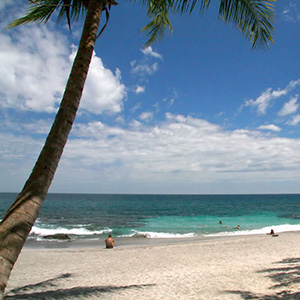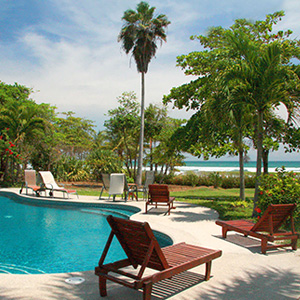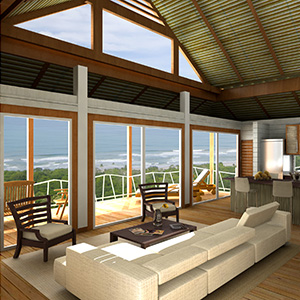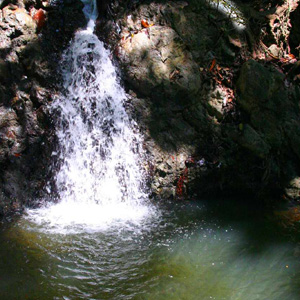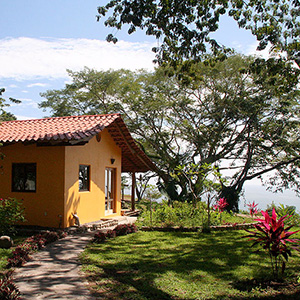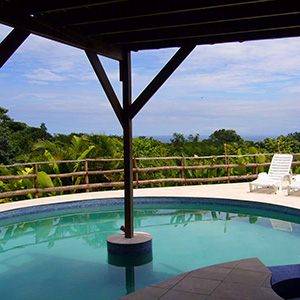GUIDE TO BUYING A PROPERTY IN COSTA RICA
By Mercedes Elizalde
Investing and buying property in Costa Rica is the dream of more people worldwide. The natural beauty of the country,
its people, their lifestyle, and the tropical climate make this small piece of land in Central America a great option for
those seeking a vacation home or a permanent residence.
This process should not become an unpleasant experience; on the contrary, it could mean significant gains in capital
gains and could become a good source of additional income. However, we have seen cases in which dreams have turned
into nightmares, precisely because of doing what is not recommended when buying a property in Costa Rica. In our
country, we have a very sophisticated Public Registry and a National Cadastre, in which most of the relevant information
that you need to verify is available, but where you cannot find everything you need to know to make a safe purchase.
Additionally, not all properties are registered in the Registry, so in those cases, it is necessary to carry out studies in
other entities as well.
Here are some steps that will increase your chances of making your dream of buying a property in Costa Rica safe and
secure.
1) Identify the type of property.
There are three main types of property that you could buy in Costa Rica: 1) registered property, 2) unregistered
property, and 3) property in the Maritime Terrestrial Zone.
1.1 Registered property.
Most of the properties in Costa Rica are registered and identified with a registration number known as “folio real”. If you
are acquiring registered property, the first thing you should ask for is the “folio real” number, since this will allow you to
verify if you are buying an independent property or a property under the condominium regime. The "folio real" will also
allow you to verify if the property has liens, annotations or charges that affect it, or if there are documents pending
registration. It is also important to verify the cadastral plan, since the property could be affected with limitations that do
not appear in the "folio real", however, the plan does not always identify with certainty the property that you are
buying, so you should always start any study with the number of “folio real”.
When talking about registered property, it is very important to verify whether or not what you are buying is
condominium property. According to Costa Rican law, a condominium is a special type of property, in which there are
individual private areas and common areas. The individual private areas are the private property of the condominium
owners, while the common areas are proportionally owned by all the condominium owners. When purchasing a
condominium property, it is extremely important to verify, among other things, the amount of the condominium fee and
what it includes, if the property you are buying owes condominium fees and if the condominium regulations suit your
specific needs.
1.2 Unregistered property.
There are also unregistered properties. These properties do not have a “real folio” number and are not registered in the
National Registry databases. When you buy unregistered property, you don't get a title, you get a right of possession. If
the possession of the property was acquired and maintained in a public and peaceful manner by the previous
possessors, and if the chain of possession has been for more than 10 years, you could get to register your property
through a "possessory information"; however, you should keep in mind that when you purchase unregistered property,
you are getting a right of possession, not a title to the property.
Although it may be cheaper to buy an unregistered property, it can be considered a less secure transaction, since there
is no way to know if there is a history of conflicts surrounding that property. All that can be done, in the end, is verify the
existence and legality of the documents used to transfer ownership from one possessor to another, trust the seller,
interview neighbors, and check with local courts to see if there have been any lawsuits related to the land you intend to
buy. As a precaution, it is advisable to include guarantees and contractual provisions that allow you to be compensated
in case you have to face an unexpected lawsuit.
1.3 Property in the Maritime Terrestrial Zone.
In the case of beachfront properties, most are not private property. In general, the beaches of Costa Rica are public
domain assets that are located in what is known as the Maritime Terrestrial Zone, which is a 200-meter-wide strip that
runs along the entire length of our coasts and is measured at from the high tide line (highest tide), which means that
everyone has access to it and it cannot be legitimately possessed by any person or entity. As for the remaining 150
meters, the Government can grant a concession for its use and enjoyment, but it is limited, and the land will always be
owned by the State.
It is very important to emphasize that the lands of the Maritime Terrestrial Zone cannot be owned by any private
individual or entity. Likewise, foreign citizens must consider that there are important limitations to being beneficiaries of
a concession in the Maritime Terrestrial Zone and that the intervention of expert lawyers in the matter is necessary so
that they can obtain control of a concession granted over the Maritime Terrestrial Zone.
2) Hire a lawyer.
The second step for your real estate transaction to be successful is to hire your own trusted lawyer. Although there are
many honest sellers, realtors, and developers in Costa Rica, there are also people who will do anything to get a sale,
including referring the buyer to their own attorney or someone they know will not present any obstacles to the sale. for
the transaction to take place, regardless of the consequences. To avoid unwanted situations, it is just as important to
avoid doing things yourself when you do not have enough knowledge, such as hiring a lawyer that you know will give
you adequate advice and that will only represent your interests. Make sure that they are a reputable lawyer, that they
inspire confidence and trust, that they guide you step by step on the safe side, and that they are even willing to advise
you not to proceed with a certain transaction if you think you could be harmed.
3) Conduct your own studies and research.
When you buy a property in Costa Rica, although it is not what normally should happen, you may find sellers, brokers or
developers who show you documents that show the property is in a condition to be purchased safely. Do not trust these
documents, as they may show only what they want you to see. Doing your own research on the property is necessary if
you want your purchase to be secure. Below we explain the different searches that you should carry out:
3.1 Public record studies.
Verifying the title of the property on the Public Registry website is necessary, but not sufficient. It is also required to
review the history of the property to verify if there have been conflicts around it or if there are pending claims that
could affect it in the future. You must also make sure that those who are selling you the property are in fact those who
have the right to do so and, if necessary, require that the true owners sign the documents and contracts of the sale so
that they are effective and binding.
The “folio real” of the property will also allow you to know if there are liens, charges, or limitations that affect the
property. In this way, you can find out if there are lawsuits related to the property, or situations or conditions that may
limit you in the full use and enjoyment of your property.
Reviewing the cadastral plan of the property is also essential. This would allow you to confirm if the property illustrated
on the plan is what you are being offered. Through the registered plan, you can also confirm or rule out the existence of
limitations or charges that are not shown in the "real sheet", such as the protection zone of a river that does not allow
you to build in areas of the property where you I already planned to build something. The plat can also give you clues
about potential overlaps or conflicts with neighboring properties.
3.2 Studies in the local municipality.
Before buying a property, it is also necessary to check with the local Municipality if property and municipal taxes are
due. You can also check if the property suits your needs. Some municipalities have regulatory plans that do not allow
you to build what you were planning in certain areas, or that do not allow you to develop the activity you wanted to
undertake on that specific property. Therefore, it is important to check first.
In the case of the Maritime Terrestrial Zone, it is necessary to verify with the local Municipality the validity, validity, and
ownership of the concession. These verifications must also be made with the Costa Rican Tourism Institute (ICT).
3.3 Verifications before the Ministry of Finance and the General Directorate of Direct Taxation:
If you are buying the shares or quotas of a company to acquire control of a property through the entity that acts as the
registered owner, it is also very important to verify if the company owes taxes. If the company has also had employees in
its name, it is also worth making sure that there are no labor contingencies, such as pending lawsuits or debts with the
Costa Rican Social Security Fund (CCSS). As you will see later, it is more advisable in many cases to transfer ownership to
a new company, but if that is not the case, these verifications could save you a lot of headaches.
3.4 Studies before the Courts of Justice.
When it is possible to identify liens or claims that affect or have affected the property, reviewing the status of those
claims is of the utmost importance to ensure that no risks are being assumed.
3.5 Other entities.
When carrying out your investigations on a property, it is also important to consult with the providers of electricity,
water, and telephone services (ICE, CNFL, and AyA or local ASADA), among others. Large and unexpected charges can be
avoided if they are caught early.
In the case of condominium properties, it is also advisable to check with the Condominium Administration if condo fees
are owed related to the subsidiary you wish to buy.
4) Adapt your contracts.
All transactions and negotiations are different and there are no templates or standard contracts applicable to all real
estate businesses equally. Nothing should be considered covered if it is not expressly and clearly stipulated in the
corresponding contract. Make sure you negotiate each of the terms and conditions of the contract before signing it, and
that all the details and specifications of your transaction are properly covered as agreed. If what is stated in the contract
is not what you agreed to, or if you do not clearly understand what is being stated, do not sign, discuss it and
renegotiate until you are satisfied and everything is clear. Remember that this is a significant investment and nothing
should be left to interpretation.
5) Use a new corporation.
Using your own corporation for the purchase of a property is always advisable since it protects your property from the
responsibilities that you may incur in a personal capacity. Until recently it made sense to buy a company's shares when
all seemed safe. In this way, control of the property was acquired through the entity that appeared as the registered
owner, and the transfer tax was saved. However, currently, transfer taxes must be paid, even if the property does not
change ownership if the shares are transferred with the clear intention of selling the property. That being the case, it is
better to use a new and clean corporation to acquire your property than to acquire an old company that could carry
unwanted contingencies. Additionally, changing the representatives of a company generally has a cost very similar to
that of establishing a new one. For these reasons, always choose to use your own corporation rather than stay with one
that has already been used by someone else.
Considering all of the above, the process of investing in real estate in Costa Rica is going to be much more enjoyable. If
you are ready to take the first step towards the dream of living in the south of the Nicoya Peninsula, do not hesitate to
contact us. With more than 15 years of experience, we have all the necessary resources to make it a pleasant and fun
experience.
